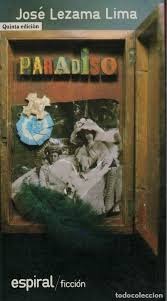
Idioma original: Español
Year of publication: 1966
Valuation: Out of competition
16 days have passed between the beginning and the end of my reading of ParadisoI could tell you all sorts of stories, yes, but I must confess that, along with moments of true reading pleasure, there have been times when I have been very close to giving up. We will see the reasons later.
That said, it is impossible to condense Paradiso in the approximately 500 words of our review. We will therefore have to get to the point and focus only on a few aspects of the book.
Classification:
¿Es Paradiso a novel or a prose poem? Although it has long sections that could be read, in their own way, as a historical novel (the part referring to emigration) or as a coming-of-age novel (Cemí’s teenage years), I think it is more correct to refer to it as Paradiso as a prose poem. In any case, it is a text with a highly autobiographical (and homoerotic) charge that we could define as a hybrid between Marcel Proust, James Joyce, an over-the-top Alejo Carpentier and a Cortázar absorbed by the spirit of Morelli.
Argument:
In general terms, the text covers the life of José Cemí, including fragments prior to his birth (because one’s life does not begin with one’s birth). But it is a very crude generalization. There are secondary lines, characters that come and go, poetic-philosophical digressions that break the conventional reading, etc.
Characters:
We have already said that Paradiso It is more a prose poem than a novel and this can be seen in the characters who are more archetypes than anything else. There is no development or evolution of the characters as such. Fronesis, Foción, Cemí’s father, Oppiano Licario and the rest of the family, all of them are representations of certain values and pass through the life of a Cemí who is an apprentice, witness, friend, companion, etc.
Style:
The key to Paradiso. A celebration of language (more surrealist than baroque, in my opinion), a text of overflowing plasticity, full of similes and metaphors that are sometimes too cryptic. But, in addition, the text is interspersed with philosophical digressions (Morelian?) that make things more difficult than the Stelvio for those who have little training in the subject.
Conclusion:
It would be stupid to recommend Paradiso to any reader. In fact, I think that it is an incomprehensible book as a whole. But it is a book that at some point you have to approach and try, more letting yourself be carried away by the sensations and images that Lezama delivers than trying to immerse yourself in a rather diffuse plot.
The anecdote:
Legend has it that Cortázar told Lezama that the text had too many commas (correctors, please refrain from reading Lezama), to which he replied that he was asthmatic and that he wanted the text to breathe like an asthmatic.
P.S. 1:
If I had to choose any part of the text, I would choose the strange and magnetic chapter XII, with the narration of the Cemí family’s stay in Florida and with a character as striking as Alberto Olaya (Cemí’s uncle).
P.S. 2:
As an example, here is a passage from the text, which also offers some of the keys to the text:
They knew that conformism in expression and ideas took on countless variants and disguises in the contemporary world, because it demanded of the intellectual the servitude, the mechanism of an absolute cause, so that he abandons his truly heroic assumption of being, as in the great epochs, creator of values, of forms, the greeter of the living, creator and accuser of that which is shrouded in blocks of ice, which still dares to flow in the river of the temporal..
Source: https://unlibroaldia.blogspot.com/2024/08/jose-lezama-lima-paradiso.html


